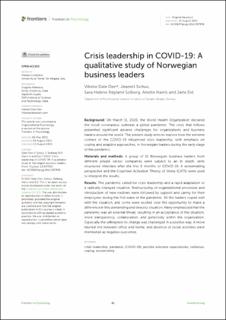| dc.contributor.author | Oen, Vibeke Dale | |
| dc.contributor.author | Svihus, Jeanett Hansen | |
| dc.contributor.author | Solberg, Sara Helene Røyland | |
| dc.contributor.author | Harris, Anette Kristoffersen | |
| dc.contributor.author | Eid, Jarle | |
| dc.date.accessioned | 2022-12-05T11:38:18Z | |
| dc.date.available | 2022-12-05T11:38:18Z | |
| dc.date.created | 2022-11-14T13:42:08Z | |
| dc.date.issued | 2022 | |
| dc.identifier.issn | 1664-1078 | |
| dc.identifier.uri | https://hdl.handle.net/11250/3035847 | |
| dc.description.abstract | Background: On March 11, 2020, the World Health Organization declared the novel coronavirus outbreak a global pandemic. The crisis that follows presented significant adverse challenges for organizations and business leaders around the world. The present study aims to explore how the extreme context of the COVID-19 influenced crisis leadership, with emphasis on coping and adaptive approaches, in Norwegian leaders during the early stage of the pandemic.
Materials and methods: A group of 11 Norwegian business leaders from different private sector companies were subject to an in depth, semi structured interview after the first 9 months of COVID-19. A sensemaking perspective and the Cognitive Activation Theory of Stress (CATS) were used to interpret the results.
Results: The pandemic called for crisis leadership and a rapid adaptation to a radically changed situation. Restructuring of organizational processes and introduction of new routines were followed by support and caring for their employees during the first wave of the pandemic. All the leaders coped well with the situation, and some were excited over the opportunity to make a difference in this demanding and stressful situation. Many emphasized that the pandemic was an external threat, resulting in an acceptance of the situation, more transparency, collaboration, and generosity within the organization. Especially the willingness to change was challenged in a positive way. A more blurred line between office and home, and absence of social activities were mentioned as negative outcomes. | en_US |
| dc.language.iso | eng | en_US |
| dc.publisher | Frontiers Media | en_US |
| dc.rights | Navngivelse 4.0 Internasjonal | * |
| dc.rights.uri | http://creativecommons.org/licenses/by/4.0/deed.no | * |
| dc.title | Crisis leadership in COVID-19: A qualitative study of Norwegian business leaders | en_US |
| dc.type | Journal article | en_US |
| dc.type | Peer reviewed | en_US |
| dc.description.version | publishedVersion | en_US |
| dc.rights.holder | Copyright 2022 Dale Oen, Svihus, Solberg, Harris and Eid | en_US |
| dc.source.articlenumber | 937935 | en_US |
| cristin.ispublished | true | |
| cristin.fulltext | original | |
| cristin.qualitycode | 1 | |
| dc.identifier.doi | 10.3389/fpsyg.2022.937935 | |
| dc.identifier.cristin | 2073574 | |
| dc.source.journal | Frontiers in Psychology | en_US |
| dc.identifier.citation | Frontiers in Psychology. 2022, 13, 937935. | en_US |
| dc.source.volume | 13 | en_US |

